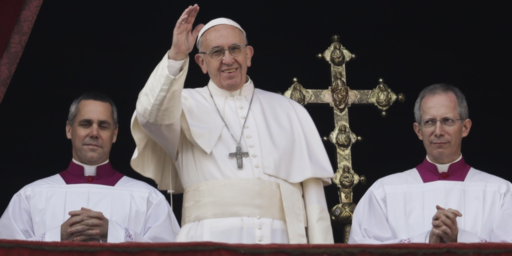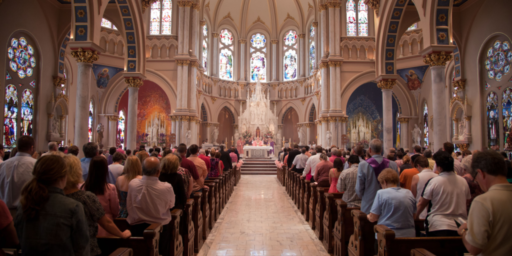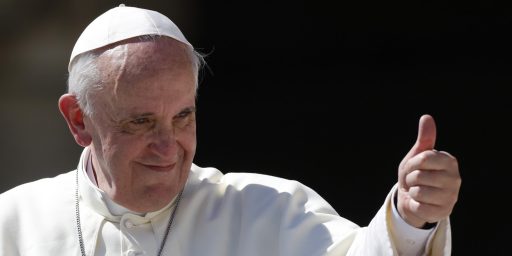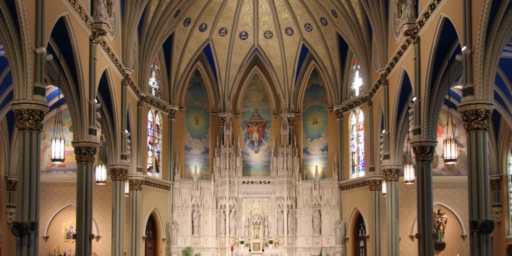Why the Catholic Church Sides with Putin and Orban
The Pope is siding with evil.

An interesting report by John L. Allen, Jr. in The Atlantic seeks to explain “Why Pope Francis Isn’t With the West on Ukraine.” The setup:
Pope Francis has staked a position on the war in Ukraine that puts him more in line with Beijing, New Delhi, and Brasília than Washington, London, or Brussels: He wants to end Ukraine’s armament by the West and negotiate an immediate cease-fire. Earlier this week, Francis vaguely alluded to a mission he was working on to end the conflict. Yet he seems to have alienated many of the actors whose support he would need to do so.
“Never in the last sixty years,” wrote Marco Politi, a journalist who has covered the papacy since 1971, “with regard to a matter of such international importance has the Holy See found itself in such a marginal position.”
Still, Francis’s actions are neither arbitrary nor irrational. They are a deliberate response to how the Catholic Church is changing—and will continue to change—in the 21st century. More Catholics than ever before live outside the West and don’t see the war in Ukraine on the same terms as Europe and the United States do. Understood in this light, Francis’s position previews the future of the Church as a geopolitical force, one that will be far less acquiescent to the West.
Francis is from Argentina, which is geographically part of the West but part of the Global South in this context. Still, while I don’t expect him to be “acquiescent to the West,” I would expect him to be on the side of good rather than evil.
Western leaders have any number of reasons to be upset with Francis’s response to the war. In addition to criticizing the West’s efforts to arm Ukraine, he has implied that NATO deserves blame for the invasion, often quoting an unnamed diplomat who accused NATO of “barking at Russia’s door.” Though Francis has condemned Russian war crimes and sympathized with Ukrainians’ suffering, he hasn’t condemned Vladimir Putin. Rather, Francis has praised him as a man of culture and even suggested that the Russian president has been acting on legitimate security concerns.
This makes him the moral equivalent of Donald Trump, not independent.
This represents a dramatic break with the Vatican’s traditional philosophy. Historically, the Holy See has practiced what academics call the “great power” model of diplomacy, attaching itself to the superpower of the day. Over the centuries, that’s meant de facto alliances with the Holy Roman Empire, the French monarchy, and the Austro-Hungarian empire. For most of the 20th century, Rome attached itself to Western powers, so much so that Pope Pius XII, the pope during the Second World War and a ferocious anti-Communist, was dubbed “the chaplain of NATO.”
This is hardly surprising. The Roman Church was inherently European, after all, historically separate from the Eastern church after the Great Schism. Beyond that, while the pope was always as much a political figure as a religious one, the two hats were in alignment during Pius’ papacy, which ran from 1939-1958. Being against Hitler and Stalin was hardly a complicated call.
No modern pope has practiced great-power diplomacy as effectively as John Paul II. By the time he celebrated his 10th anniversary as pope some 35 years ago, he was one of the most consequential leaders on the planet—not merely a spiritual figure, but a political one, leading the Cold War fight against Communism. Accumulating such influence would have been unthinkable without the West’s support.
Nowhere was John Paul’s geopolitical power more apparent than in his native Poland. The first Polish pope helped restore democracy to his country by supporting Solidarity, the national opposition movement to Communist rule. Solidarity’s massive labor strikes, which John Paul catalyzed, forced the regime to open talks with the opposition that eventually led to Poland’s liberation from Soviet rule. This was the beginning of the end of the Soviet Union, and John Paul’s part in its demise was crucial.
All true but, again, one would surely expect the first Polish pope to be opposed to the superpower that was oppressing his people and thus aligned with the other side politically.
The contrast between John Paul’s outsize role in global affairs and Pope Francis’s role in them today is hard to overstate.
As Francis completed his tenth year as pope in March, a contest between Russia and the West was once again being waged on a proxy site in Eastern Europe. Now, however, the pope is at odds with Western powers, instead of operating in concert with them.
Francis has embraced what might be seen as the Vatican’s first multipolar geopolitical strategy. Instead of hewing to the Western consensus, Francis has sought nontraditional allies in his pursuit of a solution in Ukraine, such as Hungary’s authoritarian prime minister, Viktor Orbán, in part to avoid antagonizing Russia. In this vein, the pope and his top aides have called for a 21st-century version of the Helsinki process, a diplomatic effort to reduce tensions during the Cold War that brought together a diverse set of Eastern and Western nations.
Again, siding with Putin and Orban isn’t a show of independence from the West but an alignment with malign forces.
One reason for the Vatican’s geopolitical realignment under Francis is biographical. As the first pope from Latin America, Francis came into office feeling the same ambivalence about the United States and the other Western powers as many Latin American leaders, given America’s history of interference in the region.
But the principal reason is demographic.
In 1900, there were roughly 267 million Catholics in the world, more than 200 million of whom were in Europe and North America. At the time, the makeup of the Church was not much different from what it was in the 16th century.
By 2000, there were nearly 1.1 billion Catholics in the world, but only 350 million of them were Europeans and North Americans. The overwhelming majority, 720 million, lived in Latin America, Africa, and Asia. More than 400 million lived in Latin America alone. By 2025, only one in five Catholics will be a non-Hispanic Caucasian.
This is the most rapid, and most sweeping, demographic transformation of Roman Catholicism in its 2,000-year history. Perhaps the only real comparison is to the first decades of the Church, when Saint Paul left Asia Minor to evangelize Greece and Rome, thereby transforming Christianity from a sect within Palestinian Judaism into a transnational religious movement.
That the developed world has become much less religious is not new news. It’s been a trend going back to the Enlightenment. Indeed, faith-based obedience to authority is exceedingly hard to square with modernity and critical thinking. Most who’ve managed to do so have done so by picking and choosing the parts of theology they would adhere to while quietly rejecting the rest.
So, yes, from a sheer marketing perspective, Francis has to take the views of his customer base into account.
The Vatican is always slow to respond to such changes. As the old saying goes, if you hear that the end of the world is coming, head for Rome, because it will get there last. Francis’s papacy—and his position on Ukraine in particular—represents the beginning of the Church’s pastoral and political expression of its new demographic realities.
The best way to make sense of Francis, then, isn’t in terms of left versus right, or even East versus West, but North versus South. Across the global South, the conflict in Ukraine is seen largely as a European affair, one without an obvious hero or villain. The pope’s call for a halt to arms transfers, an end to the fighting, and negotiations that all sides could support coincides with the majority sentiment among Catholics who don’t live in NATO member states.
The problem with all of this is that it requires Francis to not only reject the West but centuries of Just War doctrine created by his own church, going back to Augustine and Aquinas. Putin invaded a neighbor without just cause and has committed mass atrocities, thus violating every principle of both jus ad bellum and jus in bello. Treating the situation as though it were simply a diplomatic squabble that needs to end is, well, evil according to his own church’s longstanding teachings. That those teachings are at the core of international human rights law simply compounds the evil.
The Catholic Church is not a democracy. But Western critics have for centuries demanded that it become more responsive to the will of the people over whose souls it claims jurisdiction. Perhaps, therefore, observers jarred by Pope Francis’s position on Ukraine might pause for a moment to consider whether Francis is simply reflecting the instincts and desires of his base, to use the political jargon.
For better or worse, the worldviews of his constituents will move further and further from the conventional political wisdom of the West. Should we be surprised when he rejects it?
But that’s a sophomoric argument. Western reformers are calling for the church to abandon doctrines that are literally pre-medieval, especially with regard to the role of women in the church and society. That’s simply a whole different animal than turning a blind eye to evil.






One wonders how Francis would feel being equated with Donald Trump, but the comparison is inevitable–and very apt.
The Valeriepieris Circle. UN median population forecasts that have Africa going from just under 1.5 billion to almost 4.0 billion by 2100. Decreasing religiousity in the West. If you’re running a religion and want to expand, who are you going to pay attention to?
I am used to the church siding with evil.
While I thought the Atlantic piece was interesting, I think he overlooked two hugely important factors, probably because they are religious (in the “Church as an institution” sense, not in the sense of Christianity). The first is the centuries long effort to restore the full church after the Orthodox Schism of 1054. My guess is that Francis (and any modern pope) considers healing this rift as paramount over just about anything else, and recognizes that a rapprochement will take decades or centuries and must be carefully nurtured every step of the way. From that perspective, the Roman Catholic Church cannot side with the West against Putin, as that would put them in direct opposition to the Russian Orthodox Church, which is closely tied to him and rabidly and extremely pro-war.
On another front, an important factor in how the institutional Church views Orban and Putin as well as the right wing elements in Poland and other countries is that this generation of rightists have allied themselves with the institutional churches predominant in their regions. As head of such an institution the Pope no doubt recognizes the declining power and influence of churches in the Western and democratic worlds and so possibly views these Neo-fascists support for their churches as more important than their stand on human rights and other matters.
I certainly would wish him to be on the side of good rather than evil, but it’s the Catholic Church: I would expect him to be on the side of the powerful rather than the weak.
@MarkedMan:
Except that the war has split the Orthodox Church, and the Ecumenical Patriarch Bartholomew granted autocephaly to the Orthodox Church of Ukraine and has accused the Russian Orthodox Church of crimes related to the invasion. Saying this is an effort to heal the schism would be like the Orthodox Church trying to heal the schism with the Catholic church by building a closer relationship with the Archbishop of Canterbury
Quoting from the interview cited in the Atlantic piece”
Francis on Putin and “culture”
Far short of an endorsement. Way short of “siding with evil”.
@Stormy Dragon:
This complicates things, but it is not easy to suss out HOW it complicates things. Some factors:
The Ukrainian Church is small compared to the Russian Church
The Ukrainian Church has separated from the Russian Church, and a Pope endorsing them would lend legitimacy to such schisms – exactly the opposite of what they would be trying to accomplish in the long term
The Orthodox politics that led to the Ecumenical Patriarchate accepting Ukraine’s split probably has more to do with his rivalry with the Russian Orthodox Patriarch than any Christian or moral consideration. A Pope wanting to heal a centuries long schism probably sees the long game as a future pope being accepted as the Orthodox Patriarch for one or more of the churches rather than those Patriarchs admitting error and returning to the Roman church. If the Papacy were to be seen as picking sides in the intra-Orthodox political battles it would only harm such an effort.
“I would expect him to be on the side of good rather than evil.”
You mean turning his back on centuries of Church practice? That’s a lot to ask, even from a liberal pope.
@wr: Note to self: Read the other replies before chiming in.
There is no organization that currently exists on the planet that is more authoritarian than the Catholic Church, as far as I can tell.
I’ve been appreciative of Francis thus far, as he tries to move the Church off ideology and back to a pastoral focus. (I’m not a Catholic…) I’m not thrilled with this. Ukraine has been subject to multiple military invasions, but NATO is provoking them. Yeah, sure.
However, this is the fruit that falls from the tree of Bush’s adventure in Iraq, among other things. I’m not at all surprised so many in the world think of the US this way.
Next up…Why the Catholic Church Protects Pedophiles
I’m shocked, shocked the catholic church would side with evil.
@Jay L Gischer:
That’s why it is so disappointing that Francis is lending comfort to Putin. A bit of irony, in all likelihood, JPII would have unequivocally supported Ukraine. The memories of Russian imperialism would have been too raw.
@Bob@Youngstown: That particular comment would certainly not be indicative of endorsing Putin and siding with evil, but I think that the larger position seeking “peace” and blaming NATO for provoking Russia endorses, and maybe even reinforces, Putin’s claim that Ukraine doesn’t have a right to exist except as a colony of Russia, that there are no Ukrainians, and that
NATO and the USthe portion of the world that disagrees with Putin are interfering in an internal conflict*. The larger position strikes me as endorsing Putin and siding with evil–or at least is close enough to suffice until a better example comes along.*And the internal conflict argument is one that may have more fans internationally than we realize. An American friend of mine in Seoul holds the same view and would normally take the side of self-determination and promotion of democracy. One example certainly doesn’t make a trend, but for me, it makes me wonder what motivates his position.
@OzarkHillbilly: @DK: As horrible as the coverup of pedophile priests is/was, I see this as worse. In the former case, it’s rank cowardice and ass-covering to save the institution itself, mostly in the aftermath of a horrific discovery. Craven as hell but at least understandable. Here, they’re openly siding with the monster just because *while the atrocity is still ongoing*!
Other accounts seem to place the Pope’s position as something other than “siding with Putin”. Perhaps the siding with evil aspect is is just the Atlantic’s opinon on the matter.
https://insidethevatican.com/news/newsflash/letter-123-2022-friday-december-9-sachs-time-for-talks/?gclid=Cj0KCQjwmN2iBhCrARIsAG_G2i6Jmfsudrz-V7cL016rU2R-JuBC7WvkxHmS2P7UTQvX77DMnchey4MaAqKqEALw_wcB
https://responsiblestatecraft.org/2023/05/05/diplomacy-watch-breaking-down-the-popes-peace-mission/
Has it not occurred to people that the Pope is a shithead? Even this Pope — this somewhat better Pope than the previous few Popes — is a shithead.
The interests of a massive, multinational organization are not going to align with anyone’s definition of morality, even if that organization’s main product is statements about morality.
From covering up the sexual abuse of children, back to Pius XII playing footsie with Hitler, all the way back to the Inquisition and the Crusades… it’s a collection of shitheads. The people who aren’t shitheads aren’t up for consideration for the top job.
I’m not as anti-religion as some people on this site, but the Catholic Church is barely religion. Religion is just a product they sell.
The Catholic Church is perhaps best understood as a roughly two thousand year old lifestyle and branding company, which has often been able to use the power of the state (directly or indirectly) to eliminate competition and expand markets.
While I don’t see the Vatican as being objectively pro-Russian, their stance is very much befuddling. One country attacked another country; raped, tortured and killed its inhabitants while kidnapping the young and looting the ground. It’s a moral imperative to protect and defend Ukraine in such circumstances, so what the hell is the Pope talking about when both sides blah blah blah. Here is the one great evil of our times and the Catholic Church bungles it. Unbelievable. Then again, their view on Hitler could have used more spine so maybe we should never expect to see Rome as a guiding light.
@Raoul:
Probably because if you want to be a mediator you must not take a side.
That wasn’t their only sin James, I could tell you horror stories, none of which you hadn’t heard in comedy form. Because that was how we dealt with that trauma.
The Church has a lot to answer for. I’d like to say I believe they will but, tbh? I don’t. Too many people want to bury it.
Or too put it another way, pretend it was all fun and games.
@James Joyner: And James, you really have to get over this obsession with pedophile priests. It’s a distraction from all the other sins the Church imbibed in.
Intellectually lazy default to campist cliche thinking, IMO.
Francis himself, or advisors from that milieu.
Who knows.
Needs to be mugged by the Jesuits. LOL.
And @MarkedMan: the intra-Orthodox thing is a massive error, it that is what the papacy is thinking. Arguably the Ukraine autocephaly is more vigorous than the Russian, in terms of tithing and attendance.
Part of the reason for Moscow Patriarchate’s rage re. Ukraine (and very similar to Putin’s in some ways) is loss of a meal ticket.
And the rest of Orthodoxy is far more likely to align with the decisions of the Ecumenical Patriarch than the Moscow Patriarch, whose lifestyle is an ill-concealed scandal, and whose pretensions annoy lots of other Orthodox.
Russian Orthodoxy’s subservience to the Russian state has a long history that other branches are very cognizant of.
@James Joyner:
I just don’t see this as “siding with the monster”.
Siding with the monster would look like advocating that Ukraine unconditionally surrender it’s people and property to Putin/Moscow.
To me it looks like the Pope is advocating for some peaceful settlement for the purpose of ending the senseless loss of life. I don’t see that as a Putin goal.
Rather, I sense that Putin’s goal is the reunification of the entirety of Ukraine as a Soviet state, with Moldova, Romania, Hungary, and Slovakia as the next targets.
–
Not being religious anymore, I’m only dimly aware of the implications of the Orthodox church angle. (I guess I should have paid more attention when a schizophrenic and very Catholic old lady ranted about it to me on my Meals on Wheels route. Yes, she was defending Putin, too, even though this same ladt thought Reagan was the greatest President ever.)
Anyway, if Francis is really trying to influence the situation in a positive way, he could do worse than buttering up Putin a little bit. “Oh, I totally understand, Vlady, everybody is against you. They just don’t know you like I do! Maybe I can help you out of this quagmire.”
It’s the kind of lazy evil every parent who declares “I don’t care WHO started it, I’m ending it!” does – they prefer peace and quiet over dealing with the actual issue, its cause and fallout. Taking the generic stance of “pro-peace” inherently sides you with the aggressor and gives them a pass. It breeds resentment from those who were wronged and then silenced; smug justification for those who started it as well as the knowledge they can do it again without fear of outside interference.
There can be no “peaceful settlement” for someone who was unjustly attacked and then had supposed authority figures tell them to stop fighting back and accept the hurt so others aren’t bothered. That’s called accepting abuse, not peace. I really don’t think this is about the loss of Ukrainian lives or he’d have been talking about this since day one. It really has the feel of “you kids have been fighting for hours now stop it this has gone on long enough” . Why should Ukraine listen to someone who doesn’t care about them, just simplistic “peace for peace’s sake”?
August 2022:
NYT goes on to say:
Emphasis added.
@Bob@Youngstown: @Bob@Youngstown: To me, neutrality in a case where one side is clearly evil is effectively siding with evil. It parallels Trump’s “very fine people on both sides” narrative on Charlottesville.
If the Pope were to condemn Russia as “evil” it would be tantamount to calling for a holy war, or crusade, against the Russians, which would be an unlearned thousand year old lesson for the Catholic church. I can’t easily picture any modern pope seeking to or even risking fanning the flames of any war with religious zeal.
The modern church is pacifist in nature, so perhaps trying to act as mediator is the best they feel they should do.
@James Joyner:
Doubling down?
Switzerland was neutral during WWII, as was Sweden and Portugal. So does that mean they “sided with” Hitler’s evil?
In any event, the Vatican’ statement that the war was initiated by Russia and ” condemning it as morally unjust, unacceptable, barbaric, senseless, repugnant and sacrilegious,” doesn’t sound anything like “siding with Russia”.
There is no parallel with Trump’s remarks, he seemingly just didn’t want to condemn the actions of his merry band of voters.